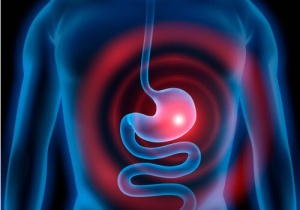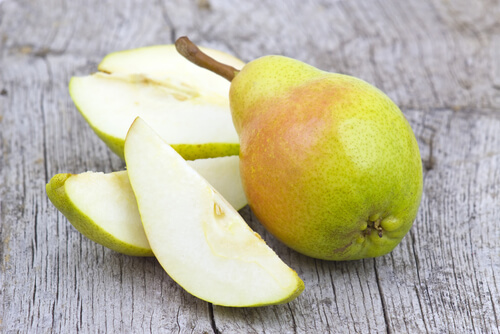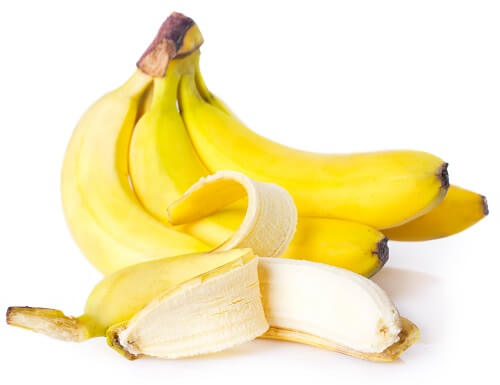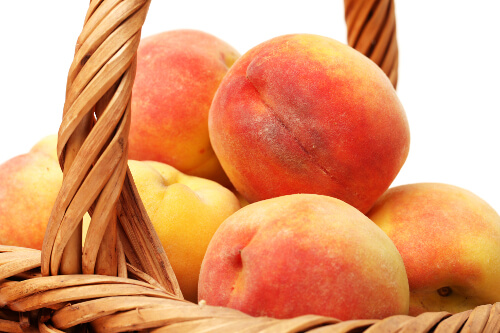Fruits for Gastritis - Six of the Best


Reviewed and approved by the pedagogue in physical education and nutritionist Elisa Morales Lupayante
Gastritis could be caused by several different things. Chief among these are unhealthy lifestyle choices. If you feel symptoms like vomiting, back pain, abdominal swelling, or chronic fatigue, you should consult a doctor to give you professional recommendations and prescribe the appropriate medicines. But there are also some natural remedies for combating illness. Today we’ll be talking about fruits for gastritis.
In this article, we’d like to discuss a few fruits that could be beneficial in combating gastritis and preventing those strong stomach pains. These fruits for gastritis are characterized by their high levels of nutrients and fiber.
1. Fruits for gastritis – Pears
Fruits are full of vitamins B1, B2, B3, A, and C as well as fiber. That makes them are some of the most potent fruits for gastritis problems. They may be able to ease problems of the nervous system and the digestive tract.
2. Papaya
This is one of the most important fruits for gastritis because it contains vitamins B1, B2, A, and C. It’s also rich in minerals like Magnesium, Iron, Sulfur, and Potassium. All of this adds up to it being one of the best fruits for ensuring good digestion. But not just that – it’s also beneficial for the skin, hair, bones, and good immune system functioning.
Dice up a papaya and add it to a blender with a glass of skim yogurt. Blend it for a few minutes and drink a glass after breakfast, lunch and dinner. It’s a treat!
3. Bananas are good fruits for gastritis
Bananas have very high levels of fiber. These are low in fats and proteins, but they they are also an excellent source of energy. The yellow fruits help accelerate the pace of digestion, providing a slightly laxative effect. Aside from that, they are rich in zinc, which helps strengthen hair and fight hair loss.
If you suffer from gastritis, ripe bananas are some of the best fruits for gastritis. These are better than green bananas because consuming them green could be damaging to the stomach.
4. Coconut
Coconut is marked by high levels of magnesium, phosphorus, calcium and potassium. It’s one of the great fruits for gastritis because of its fiber content, which improves intestinal movement. Just like bananas, it acts as a light laxative cleanses the body.
Read also:
If you often feel bloated, we recommend consuming a glass of coconut water daily.
5. Peaches
This exquisitely sweet fruit has a great number of properties that can be beneficial to your health. It acts as a diuretic and laxative. Peaches also contain vitamins A, C, and E, which help prevent illnesses like Alzheimer’s Disease, cataracts, and cancer.
It is rich in minerals like potassium, phosphorus, and magnesium, which take part in good immune system functioning. Because you can digest it easily, it helps the liver by making digestion easier on the body.
If you want to make a drink full of fruits for gastritis using peaches, here’s a recipe for you!
Ingredients:
- 2 tablespoons of peach leaves
- 1 cup boiling water
- Stir the leaves in the water for a few minutes, then cool and drink one cup. You should drink this two or three times a day.
6. Apples
When apples come into contact with water, they create a gel in the body that helps protect the intestines. This is accomplished through a compound known as pectin. Gastritis tends to manifest in one of two ways: constipation or diarrhea. If you don’t have constipation, but rather diarrhea, this fruit will absorb liquids, which solidifies feces.
As you can tell, these fruits for gastritis can be very helpful when fighting the discomforts caused by the ailment. It’s recommended that you vary which ones you consume, though. Change them up from day to day so that you get a wide range of benefits. You could also look for recipes that motivate you to eat more fruits for gastritis and will therefore improve your life quality.
So…which fruits do you consume regularly?
All cited sources were thoroughly reviewed by our team to ensure their quality, reliability, currency, and validity. The bibliography of this article was considered reliable and of academic or scientific accuracy.
-
Apostolopoulos V, Antonipillai J, Tangalakis K, Ashton JF, Stojanovska L. Let’s Go Bananas! Gren Bananas and their Health Benefits. Pril (Makedon Akad Nauk Umet Odd Med Nauki). 2017 Sep 1;38(2):147-151. doi: 10.1515/prilozi-2017-0033. PMID: 28991769.
- Ebrahimpour, S., Esmaeili, H., & Ghadimi, R. (2017). Food bioactive componts, a possible adjuvant for H.pylori eradication. Caspian journal of internal medicine, 8(2), 131–132. https://doi.org/10.22088/cjim.8.2.131
- Fermín, M., Agustín, B., & Miguel A, M. (2010). Estreñimiento. Instituto de Trastornos Funcionales y Motores Digestivos.
- Fernández Condori, R. C. (2015). Efecto de la ingesta de las frutas de guanábana, sacahatomate, aguaymanto y tumbo serrano sobre la glicemia a través del índice glicémico. https://repositorio.usmp.edu.pe/bitstream/handle/20.500.12727/2091/Fernandez_rc.pdf?sequence=3&isAllowed=y
- Giuseppina Mandalari, Carlo Bisignano, Santa Cirmi, Michele Navarra, “Effectiveness of Citrus Fruits on Helicobacter pylori“, Evidence-Based Complementary and Alternative Medicine, vol. 2017, Article ID 8379262, 8 pages, 2017. https://doi.org/10.1155/2017/8379262
- Juárez, I. C., & Romero, I. (2007). Plantas con actividad anti-helicobacter pylori: una revisión. Boletín de la Sociedad Botánica de México, (80), 35-61. https://www.redalyc.org/pdf/577/57780005.pdf
- Mutakin, M., Fauziati, R., Fadhilah, F. N., Zuhrotun, A., Amalia, R., & Hadisaputri, Y. E. (2022). Pharmacological Activities of Soursop (Annona muricata Lin.). Molecules, 27(4), 1201. https://www.mdpi.com/1420-3049/27/4/1201
- Muss C, Mosgoeller W, Endler T. Papaya preparation (Caricol®) in digestive disorders. Neuro Endocrinol Lett. 2013;34(1):38-46. PMID: 23524622.
- Riechmann, E. R., Torres, J. B., José, M., & Rodríguez, L. (2009). Diarrea aguda. Protocolos de La Sociedad Española de Gastroenterología, Hepatología y Nutrición Pediátrica y La Sociedad Española de Pediatría. https://doi.org/10.1002/14651858
- VOMERO, Nathália Dalcin, & COLPO, Elisângela. (2014). Nutritional care in peptic ulcer. ABCD. Arquivos Brasileiros de Cirurgia Digestiva (São Paulo), 27(4), 298-302. https://doi.org/10.1590/S0102-67202014000400017
- Yokota, J., Kitaoka, T., Jobu, K., Takuma, D., Hamada, A., Onogawa, M., … & Miyamura, M. (2011). Eriobotrya japonica seed extract and deep sea water protect against indomethacin-induced gastric mucosal injury in rats. Journal of natural medicines, 65(1), 9-17.
This text is provided for informational purposes only and does not replace consultation with a professional. If in doubt, consult your specialist.











